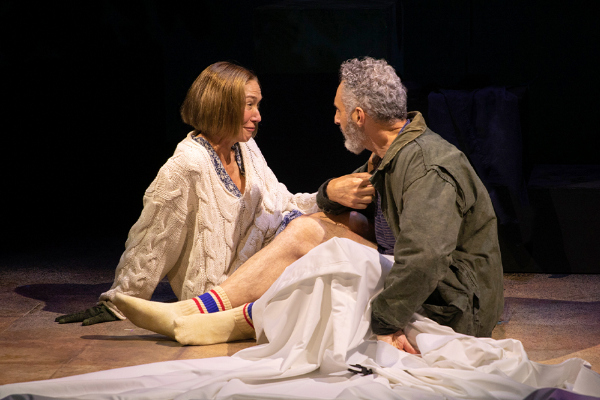Sabbath's Theater
Adapted from the novel by Philip Roth; By Ariel Levy and John Turturro; Directed by Jo Bonney
Produced by The New Group
Off Broadway, Play
Runs through 12.17.23
Pershing Square Signature Center, 480 West 42nd Street
by David Kaufman on 11.4.23
 Elizabeth Marvel and John Turturro in Sabbath's Theater. Photo by Monique Carboni.
Elizabeth Marvel and John Turturro in Sabbath's Theater. Photo by Monique Carboni.
BOTTOM LINE: In this adaptation of Roth's famous novel, it's the acting that shines, especially that of Elizabeth Marvel.
Given the title of Philip Roth’s Sabbath’s Theater, the author’s 21st novel, a theatrical adaptation was perhaps inevitable; for Roth fans, it was clearly irresistible. As written for the stage by Ariel Levy and John Turturro, The New Group's production of Sabbath’s Theater focuses on the eponymous Mickey Sabbath (Turturro), a 64-year-old puppeteer and womanizer whose latest conquest is Drenka Balich (Elizabeth Marvel). The wife of an innkeeper, and a Croatian American prostitute a dozen years Sabbath’s junior, Drenka considers herself Sabbath's “sidekicker.”
We also meet Sabbath’s put-upon wife Roseanna (also Marvel), a hardcore AA member who nearly drank herself to death. And we learn of Deborah (Marvel again) and her “underthings.” It’s Deborah’s pink panties that Sabbath puts in his pocket before later donning them like a yarmulke on his head. But clad in a Levi’s jacket and blue jeans “as narrow as her cranelike legs,” it’s Drenka who wins our sympathy, especially as realized by Elizabeth Marvel. Marvel’s winning Croatian accent is strong evidence of her having worked with dialect coach Kate Wilson.
Sabbath tells us that if he had “said yes to Jim Henson some thirty years earlier,” he would have been “the fellow inside Big Bird” all that time. But then, Sabbath’s saga is as much about what he didn’t do as what he did. As brought to quirky, theatrical life by Turturro in another star turn, it’s also about the misanthropic Sabbath’s general misery and malaise with life. Even though he talks about his suicide, in the end Sabbath says, “How could I leave? How could I go? Everything I hated was here.”
Such a focus bypasses Roth’s more customary sense of humor and irony, which circumscribe Sabbath’s story as well. And there are, of course, the bawdy elements one would expect from the man who wrote and indeed established his literary credentials with Portnoy’s Complaint. Sabbath could easily be speaking for Alexander Portnoy when he says, “Everybody masturbates in libraries. That’s what they’re for.”
Sabbath’s tale is dripping with licentious references such as his “going down on Drenka,” his “drooping scrotum,” and his always pursuing “God willing, more pussy,” as this wizened, arthritic, “heavyset, white-bearded man” relays his own history while living out his final days in rural Massachusetts. In a coup de theatre which relies on the combined skills of Arnulfo Maldonado (set and costumes), Jeff Croiter (lighting), and Alex Basco Koch (projections), Mickey Sabbath, with his back to us, masturbates at Drenka’s gravestone with explosive results. Sound designer Mikaal Sulaiman is also to be applauded for what were once deemed quadrophonic effects and for incorporating both Billie Holiday and a whistling version of “Don’t Fence Me In.”
Though we never meet his beloved brother Morty who perished in World War II, Sabbath’s friend Norman becomes a recurring presence, effectively portrayed here by Jason Kravitz with a naturalness, an ordinariness, that befits the character’s name. But in addition to Turturro, and under Jo Bonney’s imperceptible direction, it’s Elizabeth Marvel as the numerous women in Sabbath’s life who electrifies the stage with her presence. Both as written and as realized by Turturro, Sabbath is, in a word, mischievous. Whereas among the many words that Marvel in turn invokes, majestic quickly comes to the forefront.
During an on-stage conversation with Kravitz and Artistic Director Scott Elliott following a Sunday matinee, Turturro revealed that Roth became a fan after seeing him in Quiz Show, and that their admiration for each other was enhanced by a mutual interest in Jewish Holocaust survivor and author Primo Levi. Roth also proposed Turturro perform a theatrical version of Portnoy’s Complaint. Though Turturro added he’s now too old to fulfill that particular wish, his willingness to expose himself both literally and figuratively, as he movingly does in Sabbath’s Theater, testifies to his abiding affection.
(Sabbath's Theater plays at the Pershing Square Signature Center, 480 West 42nd Street, through December 17, 2023. Running time is 100 minutes, no intermission. Performances are Tuesdays at 7:30; Wednesdays at 2 and 7:30; Thursdays and Fridays at 7:30; Saturdays at 2 and 8; and Sundays at 2. Tickets are $35-$110 and are available at thenewgroup.org or by calling 917-935-4242.)
Sabbath's Theater is by Ariel Levy and John Turturro, adapted from the novel by Philip Roth. Directed by Jo Bonney. Choreography by Kelly Devine. Scenic and Costume Design by Arnulfo Maldonado. Lighting Design by Jeff Croiter. Sound Design by Mikaal Sulaiman. Projection Design by Alex Basco Koch. Shadow Puppet Design by Erik Sanko. Wig and Makeup Design by J. Jared Janas. Dialect Coach is Kate Wilson. Production Stage Manager is Valerie A. Peterson. Assistant Stage Manager is Stephen Michael Varnado.
The cast is John Turturro, Elizabeth Marvel, and Jason Kravits.

